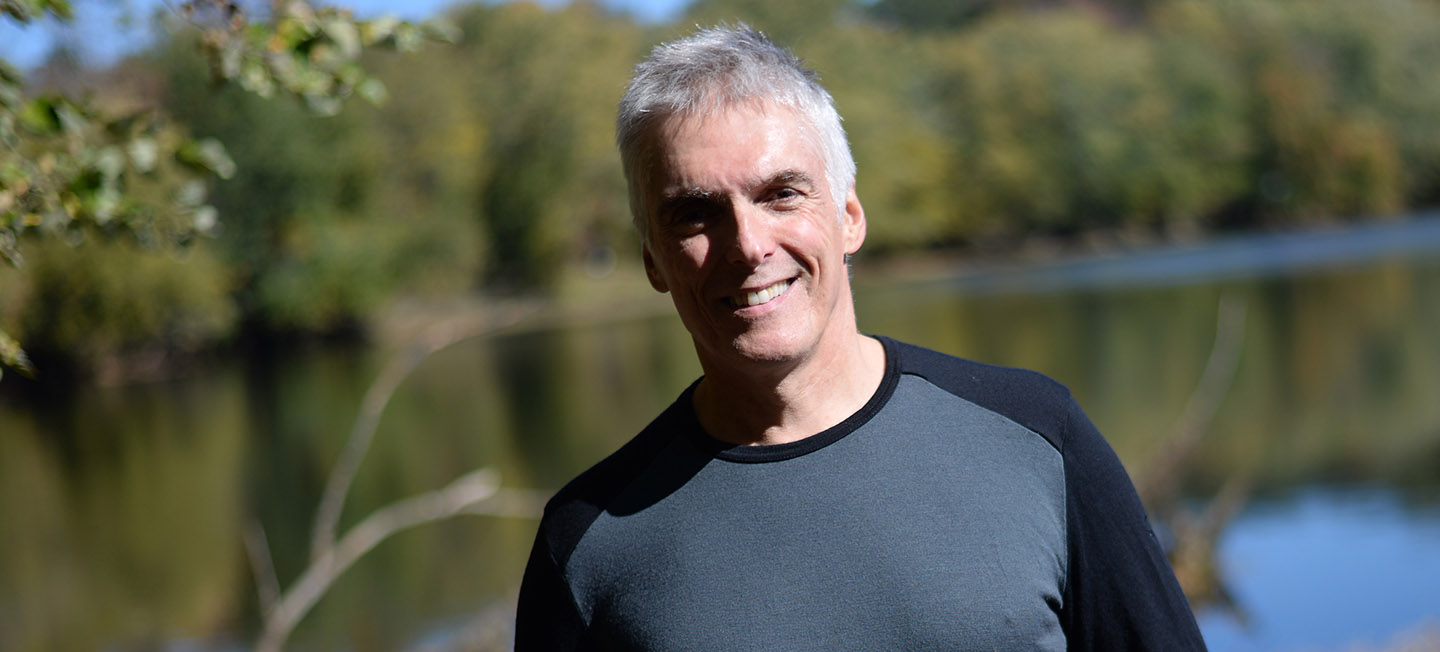Hometown Hockey
Q&A with COM's Jay Atkinson, author of Ice Time

Author Jay Atkinson discusses the resonance of Ice Time, 20 years after it was originally published. Photo by Paul Bilodeau.
While reliving high school experiences only happens to most of us in our dreams — or nightmares — COM Lecturer Jay Atkinson is going in for the third time.
In 1999, Atkinson returned to his high school as a volunteer assistant coach for his old hockey team, the Methuen (Massachusetts) Rangers. There, he spent a year observing the lives of the players for his book Ice Time, a deep-dive investigation into youth hockey culture in small towns.
Ice Time was named by Publisher’s Weekly as a Notable Book of the Year for 2001, and landed on the bestseller list with the New England Independent Booksellers Association. Now, the book is finding new audiences with the release of a new, 20th anniversary edition.
“A lot of these kids are now young parents, and many have sent me messages that they’ve bought the [new] book,” Atkinson says. “It’s like a supercharged version of the high school yearbook. It couldn’t have been written by someone outside the town.”
For Atkinson, the inspiration for the project came after he left the area in which he grew up. “I spent ages 18 to 25 away from here,” he says. “When I came back, I started exploring as a writer all the things I took for granted as a kid. For example, I thought everybody skated over the road when it got icy on their way to skate at the local pond.”
Here, Atkinson answers some questions about the project:
Q&A
With Jay Atkinson
COMtalk: What is it about your book that has resonated with audiences for such a long period of time?
Atkinson: There’s a whole network of small towns, from Connecticut to Nova Scotia, from Boston to Maine, to Minnesota, and across Canada, that have the same relationship to hockey as people in Texas do to football. Buried within the hockey culture, like an insect buried in amber, there’s a small-town resonance that goes back to [writers] Tom Wolfe and Sinclair Lewis. There’s something that hasn’t changed about hockey in these small towns, so it’s like a time capsule.
COMtalk: And what is that culture like?
Atkinson: The kids start very early. They have to go to hockey practice at 5 a.m. Hockey parents in Vermont would relate to hockey parents in Ontario. They’d say, “here we go again in the freezing cold rain with a cup of coffee.” It’s a very Irish Catholic sport, especially in Boston and Massachusetts, where there’s a large Irish contingent. It’s not an unfamiliar sight in New England to see someone who’s getting ready to play pull the crucifix out of their collar, kiss it, and put it back under their jersey. A lot of the Catholic prep schools were powerhouses in hockey before anyone else. The church and school and sport have a connection. A lot of kids I coach I see at Mass, as well as a lot of guys I grew up playing with. Over Christmas I’ll go to Mass to see people and whisper about the good old days.
COMtalk: As a creative nonfiction author, how did you draw the line between being invasive and depicting an honest portrayal of your subjects?
Atkinson: In August of 1999, there was a meeting with all the players who were likely to make the varsity team, as well as the parents, teachers, and athletic staff. In fact, one of the main characters in Ice Time is Methuen High’s hockey coach Joe Robillard, who still lives in Massachusetts. He was one of the goalies on BU’s 1972 national championship hockey team. It was explained to the parents that I was an alum and a professor, and I was going to spend a year with the team, writing about their children. Everybody signed waivers. I tried to show some of the kids’ trials and tribulations without revealing anything that would harm them in the future. For example, one of them was caught smoking marijuana twice during the season. This was 20 years ago, and marijuana was not as acceptable as it is today. Being older, and having the vision to look ahead, I thought, what’s going to happen to him when he’s 35 years old?
COMtalk: Are you still involved with young people and hockey today?
Atkinson: I’ve run a hockey program for the last 20 years, Methuen Fun Hockey League Skate & Read. It’s all-inclusive, we don’t turn any kids away. It combines recreational ice hockey and skating instruction with guided reading for children, so we have librarians bring books right to the rink. I’m trying to re-create what happened when I was a kid. When I was 12 or 13, I played hockey on the pond after school. There wasn’t much on TV back then, so we read books. I’d come home, my mom would make me hot chocolate, and I’d read a book about [hockey player] Bobby Orr. I wanted kids to have that old school feeling about that.
Ice Time’s 20th anniversary edition is available now. Atkinson’s ninth book, The Tree Stand, a collection of short fiction, is to be published in October 2022.



